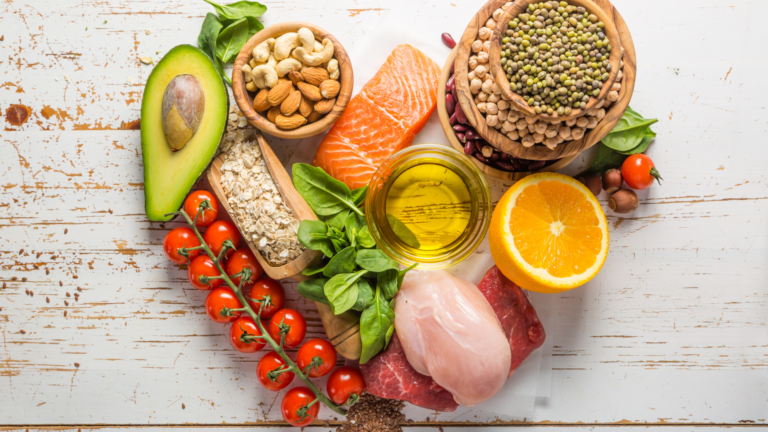Menopause is a natural phase of life that brings about changes in a woman’s body. As you embrace this transition, adopting the right nutrition and lifestyle habits can significantly improve your quality of life. From managing hot flushes to supporting bone health, here are top 10 valuable tips tailored to women going through menopause.
1. Include heart healthy fats.
Healthy fats play a pivotal role in supporting women’s well-being during menopause. As hormonal fluctuations can lead to changes in metabolism and an increased risk of heart disease, incorporating the right types of fats is crucial. Healthy fats, such as those found in avocados, nuts, seeds, and fatty fish, help maintain cardiovascular health by reducing inflammation and improving cholesterol levels. These fats also aid in the absorption of fat-soluble vitamins, like vitamin D, which is essential for bone health during menopause. Furthermore, healthy fats provide sustained energy, supporting mood stability and combating fatigue, which are common challenges during this phase of life. By including these fats in a balanced diet, menopausal women can promote overall health and manage the specific nutritional needs associated with this transition.
Try: salmon for dinner, avocado on toast or nuts for a snack
2. Choose whole grains.
Incorporating whole grains into the diet holds particular significance during menopause due to their array of benefits for overall health and well-being. Whole grains, such as quinoa, brown rice, oats, and whole wheat, offer a source of sustained energy and support in maintaining stable blood sugar levels reducing risk of type 2 diabetes. The fibre content also promotes digestive health and aids in providing a sense of fullness and satisfaction. Additionally, whole grains contain important nutrients like B vitamins and magnesium, which contribute to a balanced mood and optimal nerve function, both of which can be important factors during this phase. By choosing whole grains, menopausal women can effectively support their body’s nutritional needs, promote digestive regularity, and nurture emotional wellbeing.
Try: oats for breakfast, quinoa in a salad, add barley to a soup or brown rice with a stir fry
3. Fruits & Veggies for digestive health.
A healthy gut microbiome is central to overall health and wellbeing, reducing risk of chronic disease and inflammation in the body. While there is no gold standard of what a healthy microbiome should look like, we know that having a diverse and abundant microbiome is related to improved health and wellbeing. The American Gut Project found that people who eat 30 or more different plant foods in a week, have a more diverse and abundant microbiome than those who eat 10 or less different plant foods per week. Plant foods include fruits, vegetables, nuts, seeds, whole grains and legumes. How many different ones can you do?
4. Calcium & Vitamin D for strong bones.
During menopause, maintaining adequate calcium intake is crucial to support bone health and prevent the risk of osteoporosis. As oestrogen levels decline, bones become more susceptible to losing calcium, which can lead to reduced bone density and increased fracture risk. Ensuring a consistent supply of calcium through dietary sources like dairy products, fortified foods, leafy greens, and fish with edible bones becomes essential. By prioritizing calcium-rich foods, menopausal individuals can take proactive steps to safeguard their skeletal well-being and overall quality of life.
Try: yoghurt on your breakfast, cheese on a sandwich or fish with edible bones in a pasta bake
5. Include Soy for hormonal balance
There is a lot of misinformation about soy. The good news is that soy is not only safe but it is beneficial for women during menopause due to its rich content of phytoestrogens, primarily isoflavones such as genistein and equol. These compounds are structurally similar to human oestrogen and can provide a natural alternative to hormonal therapy. Research has found that soy may reduce menopausal symptoms like hot flushes, night sweats, and mood swings. When it comes to breast cancer, consuming soy products as part of a healthy diet has been shown to reduce the risk of breast cancer and does not increase the risk of recurrence. You can read more about what the research says about soy milk here.
Try: adding tofu, tempeh, edamame, and soy milk occasionally
6. Eat mindfully.
Embracing mindful eating offers a wealth of benefits, emphasizing a compassionate and nonjudgmental connection with our bodies and food choices. This approach encourages us to savour each bite, cultivate awareness of hunger and fullness cues, and engage our senses in the eating experience. By fostering a deeper understanding of our body’s signals, we can make choices that honour our individual needs and preferences. Mindful eating doesn’t focus on weight, but rather on fostering a positive relationship with food, promoting self-care, and nurturing a sense of pleasure and satisfaction from eating. Through this practice, we can cultivate a sustainable and joyful approach to nourishing ourselves, free from external pressures or judgments about our bodies.
Try: making time for meals in a relaxed and pleasant environment.
7. Stay hydrated
Staying well-hydrated is of paramount importance during menopause, particularly if you get bloated or suffer with temperature fluxes. Fluctuating hormone levels can lead to increased body temperature and night sweats, resulting in higher fluid loss. Adequate hydration not only helps regulate body temperature but also supports overall physiological functions, circulation, and of course, digestion. Additionally, staying hydrated can help alleviate symptoms like headaches and fatigue, which can be exacerbated by hormonal shifts. By prioritizing hydration, menopausal individuals can enhance their comfort, energy levels, and well-being throughout this transitional phase.
Try: adding fresh berries or cucumber to your water in summer and herbal tea in the cooler months
8. Prioritise sleep.
Everything is better when you’ve slept well! Including hormone regulation, mood stability, cognitive function and physical wellbeing. Hormonal changes can lead to disruptions in sleep patterns, such as insomnia and night sweats so its even more important to prioritise a consistent sleep schedule, a calming bedtime routine and a comfortable sleep environment. Including relaxation techniques like mediation, deep breathing and gratitude while limiting alcohol and caffeine can enhance sleep quality, leading to improved physical, emotional, and mental health. Empower yourself to navigate menopause with confidence and grace
9. Make friends with your body.
Our bodies are amazing! As women our body’s change and evolve with each new stage from puberty, pregnancy, post-partum and through menopause. This really just shows how amazing they are and how capable they are of adapting, healing and thrive though all of life’s stages. Its normal to gain some weight in menopause due to decreases in oestrogen. As our ovaries produce less oestrogen our body will compensate for this by making new fat cells, which also make and store oestrogen.
By embracing body changes, we foster a positive body image, reduce the stress associated with unrealistic ideals, and cultivate a healthier mental and emotional well-being. This mindset allows us to focus on our bodies’ incredible abilities, the stories they tell, and the wisdom they carry. Embracing body changes ultimately leads to greater self-acceptance, enabling us to live authentically, confidently, and with a profound appreciation for the uniqueness of our individual journey’s.
10. Include non-food moments of joy.
Life’s true treasures lie in the small, joyful moments that weave through our days, infusing them with meaning. These moments aren’t just fleeting; they’re anchors of emotional balance, easing stress and mood swings. Its these small moments that add together to calm the gut brain axis, nurture resilience, generate inner peace and just make life better.
Final thoughts
As you embrace the journey of menopause, remember that small changes can lead to significant improvements in your quality of life. By focusing on nourishing foods, self-care, and holistic well-being, you can navigate this transition with confidence and grace!
For personalized advice tailored to your unique needs, consider booking an appointment with our experienced dietitians. Together, we can create a customized nutrition and lifestyle plan that enhances your well-being during this transformative phase of life.







